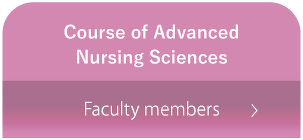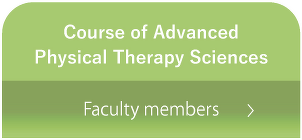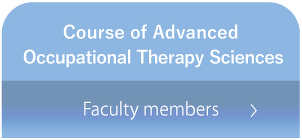Graduate Degree Programs
Policy
Curriculum Policy of graduate School (Master Degree)
Graduate School Curriculum Policy
Yamagata Prefectural University of Health Sciences Graduate School (Master Course)
In order to embody the purpose of establishing the Graduate School of Health Sciences (Master's Course), in order to cultivate practitioners, educators and researchers with advanced knowledge and skills and a broad perspective, the Graduate School of Health Sciences is organized into three broad categories: General Subjects, Professional Background Subjects and Specialist Subjects, which all students in the nursing, physical therapy and occupational therapy fields study interdisciplinary. The program is organized into three broad categories: general subjects,professional foundation subjects and specialized subjects, which are studied in an interdisciplinary manner by studentsfrom all fields of nursing, physiotherapy and occupational therapy.
The general subjects include research methods that form the basis for research activities and basic knowledge of health care.
The subjects in the professional background subjects provide the basis for studying the specialized subjects in each field and enable students to deepen their education and research and to develop a broad perspective.
Specialist subjects include special theory and special theory exercises aimed at acquiring specialist knowledge in each field, as well as special research for the preparation of a master's thesis.
In the Clinical nursing Specialist course, students are required to acquire the knowledge and skills necessary to acquire advanced nursing practice skills in specialized fields through exercises, practical training and project-based research.
Diploma Policy of graduate School (Master Degree)
Graduate School Diploma Policy
Yamagata Prefectural University of Health Sciences Graduate School (Master's Course)
- The ability to think scientifically in clinical, educational and research settings, using advanced specialist knowledge of both breadth and depth in order to discover and resolve the challenges and prospects of changing health, medical care and welfare.
- The ability to have the attitude of a highly qualified professional who has a sense of responsibility, discovers challenges and prospects, and actively contributes towards solving them, in order to improve health, medical care and welfare.
- The ability to accurately express and exchange opinions about one's own research.
Curriculum Policy of graduate School (Ph.D course)
Graduate School Curriculum Policy
Yamagata Prefectural University of Health Sciences Graduate School (Doctoral Course)
In accordance with the purpose of the Graduate School of Health Sciences (Doctoral Course), the curriculum is structured in two subject categories: common subjects, which all students in the fields of nursing, physiotherapy and occupational therapy study in an interdisciplinary manner, and special subjects, which are offered in each field of study.
The Common Subjects are designed to provide students with lectures and exercises on social issues related to healthcare in general, systems related to cooperation and collaboration with other professions that form the basis for contributing to social development, theories and concepts necessary for researchers, educators and leaders of advanced professional practice, as well as subjects designed to cultivate skills for independent education and research activities.
In the specialized subjects, subjects necessary for researchers, educators and leaders of highly specialized practice are arranged in each specialized field to cultivate the ability to pursue research themes and research methods as a professional.
Diploma Policy of graduate School (Ph.D course)
Graduate School Diploma Policy
Yamagata Prefectural University of Health Sciences Graduate School (Doctoral Course)
- The ability to think scientifically in clinical, educational and research settings, using advanced specialist knowledge of both breadth and depth in order to discover and creatively resolve the challenges and prospects of changing health, medical care and welfare.
- The ability to have a sense of responsibility, find challenges and perspectives, and have the attitude of a leader who actively contributes towards solving them, in order to improve health, medical care and welfare.
- The ability to accurately express their own research as new 'knowledge' and to exchange opinions.




